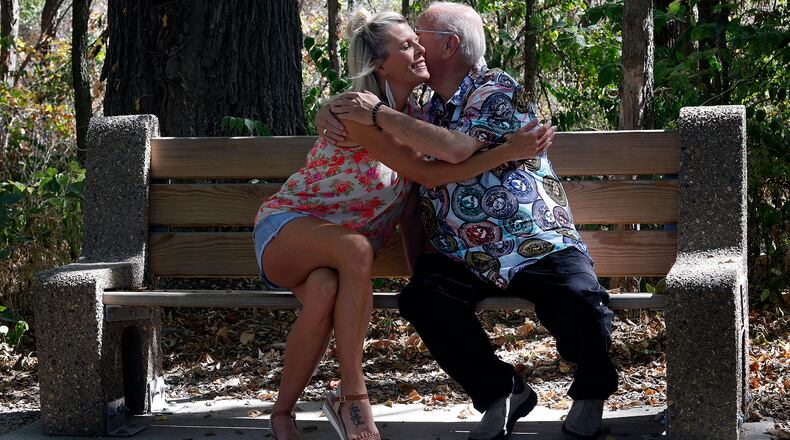“She saved my life. It’s that plain and simple,” said Hatcher, whose kidneys were failing due to diabetes.
Now, less than three years after that surgery, he wants to help Applegarth accomplish her goal of running the New York City Marathon.
Applegarth, 41, plans to run the marathon on Nov. 3 to collect money for Keep a Child Alive, a nonprofit organization that was founded to help those affected by HIV/AIDS. But first she needs to raise $5,000 for the charity.
“I’m just so proud of her,” said Hatcher, 66, of Englewood. “It’s just unbelievable.”
Applegarth, who has been named a Dayton Daily News Community Gem, said she is motivated and confident.
The Huber Heights woman trains for the marathon in between taking classes to earn her Bachelor of Science in Nursing, working as a patient care technician at Premier Health and bartending. She said that fundraising and getting sponsorships has been difficult, but she is determined.
“I think once I started training, the sky was the limit,” said Applegarth, who ran her first half marathon in August.
Donations can be made in her name on the Team KCA website. When that goal is met, she will be raising funds for the charity to run the London marathon in 2025.
Donations can be made in her name here. When that goal is met, she will be raising funds for the charity here.
Dr. Todd Pesavento, a transplant nephrologist at the Ohio State University Wexner Medical Center, where Hatcher and Applegarth’s transplant surgery took place, wasn’t shocked that Applegarth plans to run a marathon so soon.
Those who are motivated enough to become an organ donor often are also motivated to set milestones for themselves.
“If anything, sometimes donors become even healthier after they donate,” he said.
About 90,000 people throughout the country are waiting for a kidney transplant, including about 2,000 in Ohio, Pesavento said. Decades ago donors were required to be blood relatives, but advancements in medications mean there now can be excellent long-term outcomes after receiving a healthy kidney from a healthy donor who isn’t related.
Recovery for the donor can be “relatively short,” he said. Donors could be back to desk work in four weeks, or in 12 weeks for factory work. In six months, donors should have the ability to do everything they could do before the surgery.
“The added bonus is you get to help somebody,” he said.
Hatcher, who was diagnosed with diabetes about 20 years ago, said he was in denial for five years before that, ignoring signs like high blood sugar and high blood pressure. He began taking medicine and then insulin, and then underwent dialysis for about nine months. He urges everyone to ask for a kidney workup.
Applegarth, who grew up in Oklahoma but has lived in Huber Heights for almost 20 years, said she didn’t donate a kidney for the accolades or to be repaid in some way. Her husband and kids all supported her decision, and she hopes that someone would make the same choice if needed to save one of her own children.
“If more people would consider doing this, so many lives could be saved,” she said.
About the Author
